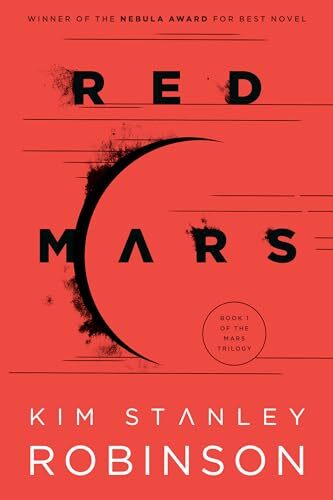
An interesting, well-researched, and somewhat plausible look at a future when humanity tries to settle Mars. Given that Elon Musk is trying to do just that, it’s fun reading through this book, and contemplating the questions it poses:
-
What technologies do we need to get to Mars? How would we initially live there? What are the extra risks of space travel and life on a planet without an atmosphere? There is a lot of interesting science and research in the book on all of these topics, so be prepared to nerd out with lots of fun discussions of how to build massive spacecraft, how to live in “space tents”, and how to build a space elevator (the scale of which is mind-boggling).
-
Should humans terraform Mars? The book does a great job of presenting both sides of the debate on whether Mars should be preserved as-is or modified to suite the needs of human colonization.
-
What political system should apply to Mars? Do the sovereign nations of earth control it? Given that the whole project is funded from earth, what rights does that give to those who foot the bill? If the initial crew share all resources, should everything remain as a shared resource on Mars, or should some sort of economy, currency, etc. develop over time? Would a society that consists solely of highly-educated scientists become a perfect utopia or be just as dysfunctional as all human societies? I don’t agree with all the answers in the book, but I enjoyed contemplating the questions.
-
What will happen to the first human colonists? Will their lives be a reality show? Will they become celebrities? The main characters in the book are several of the “first 100” Mars settlers. Although all the characters start out strong, they don’t seem to develop much through the book. This is probably the biggest weakness of the entire story. Each character represents some stance in one of the discussions mentioned above, and they stick with their opinions unwaveringly throughout the book. Robinson tries to add drama through all sorts of relationships and love triangles, but it feels forced at best and down right laughable at worst. The hyperemotional females and deeply stoic male character stereotypes are particularly annoying.
It’s not a perfect book, but overall, it’s a fun read that contains an odd mix of deep, scientific research; occasionally brilliant exposes on the nature of humanity and the cosmos; and occasionally flat, boring, unconvincing characters.
Quotes
As always, I’ve saved some of my favorite quotes:
The only part of an argument that really matters is what we think of the people arguing. X claims a, Y claims b. They make arguments to support their claims with any number of points. But when their listeners remember the discussion, what matters is simply that X believes a and Y believes b. People then form their judgment on what they think of X and Y.
And it came to her that the pleasure and stability of dining rooms had always occurred against such a backdrop, against the catastrophic background of universal chaos; such moments of calm were things as fragile and transitory as soap bubbles, destined to burst almost as soon as they blew into existence. Groups of friends, rooms, streets, years, none of them would last. The illusion of stability was created by a concerted effort to ignore the chaos they were embedded in. And so they ate, and talked, and enjoyed each other’s company; this was the way it had been in the caves, on the savannah, in the tenements and the trenches and the cities huddling under bombardment.
They lived like monkeys still, while their new god powers lay around them in the weeds.
We are the consciousness of the universe, and our job is to spread that around, to go look at things, to live everywhere we can. It’s too dangerous to keep the consciousness of the universe on only one planet, it could be wiped out. And so now we’re on two, three if you count the moon. And we can change this one to make it safer to live on.
Changing it won’t destroy it. Reading its past might get harder, but the beauty of it won’t go away. If there are lakes, or forests, or glaciers, how does that diminish Mars’s beauty? I don’t think it does. I think it only enhances it. It adds life, the most beautiful system of all. But nothing life can do will bring Tharsis down, or fill Marineris. Mars will always remain Mars, different from Earth, colder and wilder. But it can be Mars and ours at the same time. And it will be.
There is this about the human mind: if it can be done, it will be done. We can transform Mars and build it like you would build a cathedral, as a monument to humanity and the universe both. We can do it, so we will do it. So - we might as well start
The beauty of Mars exists in the human mind,” he said in that dry factual tone, and everyone stared at him amazed. “Without the human presence it is just a collection of atoms, no different than any other random speck of matter in the universe. It’s we who understand it, and we who give it meaning. All our centuries of looking up at the night sky and watching it wander through the stars. All those nights of watching it through the telescopes, looking at a tiny disk trying to see canals in the albedo changes. All those dumb sci-fi novels with their monsters and maidens and dying civilizations. And all the scientists who studied the data, or got us here. That’s what makes Mars beautiful. Not the basalt and the oxides
